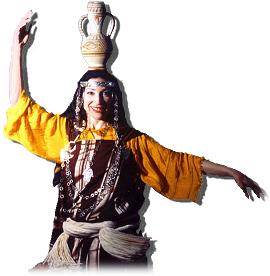- »Classes
- »Workshops/
Special Events - »Calendar
- »Gallery
- »Links
- »About Belly Dance
- »The Habiba Dance Ensemble website








Habiba
The Studio
Habiba Dance Ensemble
.
.
.
.
.
.
.
.
About Habiba
 Habiba is internationally recognized as a performer, choreographer, teacher and authority on dances of the Middle East. She has performed extensively throughout the United States and abroad in nightclubs and on concert stages. She has done extensive fieldwork in Egypt and Tunisia. She is an outreach lecturer for the University Museum of Archaeology and Anthropology and a Fellow of the Middle East Center of the University of Pennsylvania and author of numerous articles for national magazines. The International Academy of Middle Eastern Dance (IAMED) voted her Ethnic Dancer of the Year 2001. She is in the Directory of Philadelphia Artists in Education.
Habiba is internationally recognized as a performer, choreographer, teacher and authority on dances of the Middle East. She has performed extensively throughout the United States and abroad in nightclubs and on concert stages. She has done extensive fieldwork in Egypt and Tunisia. She is an outreach lecturer for the University Museum of Archaeology and Anthropology and a Fellow of the Middle East Center of the University of Pennsylvania and author of numerous articles for national magazines. The International Academy of Middle Eastern Dance (IAMED) voted her Ethnic Dancer of the Year 2001. She is in the Directory of Philadelphia Artists in Education.
Habiba is still an avid student of the dance. In addition to studying Middle Eastern Dance with America's top teachers, such as Ibrahim Farrah, her dance background includes training in ballet and modern dance, which she studied at the Martha Graham School in New York. During her numerous trips to Tunisia and Egypt, she studied with members of the Tunisian National Folklore Troupe, and took classes at the school of the Reda Troupe, Egypt's most famous dance ensemble. She has studied with many of Egypt’s top oriental teachers such as Ragia Hassan, Soheir Zaki, Mahmoud Reda and Nadia Hamdi. She has documented numerous folk performances in villages in both Egypt and Tunisia, including the dancing of the Benat Mazin, descendants of the famous Ghawazi celebrated by European writers of the 19th century.
Habiba has mastered a variety of styles, from the earthy Raks al Beledi of the Egyptian fellahin, to the exciting feat of balance seen in the Tunisian Pot Dance. Also a master of the classical Egyptian dance, Raqs al-Sharqi (also known as Oriental or Belly Dance), her depth of understanding of these cultures is such that she projects the distinct and separate personality unique to the peoples of each region. As a performer, she has an unfailing understanding of the music and the difference between folkloric and oriental styles.
Habiba is a well-known scholar and author on the subject of Middle Eastern Dance. She is a contributing writer for several dance magazines, and has published numerous features articles. She has also presented several papers before the Mid-Atlantic Region Society for Ethnomusicology, has lectured at the University of Pennsylvania, the University of the Arts in Philadelphia, and the Middle Eastern Institute in Washington, D.C. She is a featured lecturer for the University Museum of Archeology and Anthropology's Outreach Lecture Program. In 1997 she was inducted into the Hall of Fame of the American Academy of Middle Eastern Dance. She has also taught at Rakkasah East and danced and lectured at the Philadelphia premiere of the Tunisian film "Satin Rouge".
Habiba passes on the techniques and lore that she has acquired in her extensive travel and studies in her own studio in Philadelphia, where she teaches regular classes. She employs the multifaceted approach of performing, teaching, and writing about these fascinating dances, which record a vanishing way of life and demand new audiences if they are to survive.
Habiba places great importance in being a part of the cultural landscape in Philadelphia and has been invited to participate in many dance programs like Transit Dances (1995), 2000 Feet (1999) and The Horse’s Mouth (2003.)
Habiba teaches core basics used in the art of belly dance, explains the dance’s history and cultural significance, and performs this ancient dance which originated in Egypt.
PBS and WHYY have featured Habiba in a video on her teaching and her trips to Tunisia and Egypt to refine her art. See what people are saying about Habiba’s teaching, performances and videos on the Testimonials page.
Djuna Wojton has created a short documentary entitled Habiba: Belly Dancer, Teacher, Choreographer. It contains wonderful footage from the 2010 hafla of students and troupe members.
Template design by Six Shooter Media.
This website and all photographs within, are
©2010 Barbara Siegel, and may not
be used without her permission.
Website maintained by Fatima Bassmah








Habiba
The Studio
Habiba Dance Ensemble
.
.
.
.
.
.
.
.
About Habiba
 Habiba is internationally recognized as a performer, choreographer, teacher and authority on dances of the Middle East. She has performed extensively throughout the United States and abroad in nightclubs and on concert stages. She has done extensive fieldwork in Egypt and Tunisia. She is an outreach lecturer for the University Museum of Archaeology and Anthropology and a Fellow of the Middle East Center of the University of Pennsylvania and author of numerous articles for national magazines. The International Academy of Middle Eastern Dance (IAMED) voted her Ethnic Dancer of the Year 2001. She is in the Directory of Philadelphia Artists in Education.
Habiba is internationally recognized as a performer, choreographer, teacher and authority on dances of the Middle East. She has performed extensively throughout the United States and abroad in nightclubs and on concert stages. She has done extensive fieldwork in Egypt and Tunisia. She is an outreach lecturer for the University Museum of Archaeology and Anthropology and a Fellow of the Middle East Center of the University of Pennsylvania and author of numerous articles for national magazines. The International Academy of Middle Eastern Dance (IAMED) voted her Ethnic Dancer of the Year 2001. She is in the Directory of Philadelphia Artists in Education.
Habiba is still an avid student of the dance. In addition to studying Middle Eastern Dance with America's top teachers, such as Ibrahim Farrah, her dance background includes training in ballet and modern dance, which she studied at the Martha Graham School in New York. During her numerous trips to Tunisia and Egypt, she studied with members of the Tunisian National Folklore Troupe, and took classes at the school of the Reda Troupe, Egypt's most famous dance ensemble. She has studied with many of Egypt’s top oriental teachers such as Ragia Hassan, Soheir Zaki, Mahmoud Reda and Nadia Hamdi. She has documented numerous folk performances in villages in both Egypt and Tunisia, including the dancing of the Benat Mazin, descendants of the famous Ghawazi celebrated by European writers of the 19th century.
Habiba has mastered a variety of styles, from the earthy Raks al Beledi of the Egyptian fellahin, to the exciting feat of balance seen in the Tunisian Pot Dance. Also a master of the classical Egyptian dance, Raqs al-Sharqi (also known as Oriental or Belly Dance), her depth of understanding of these cultures is such that she projects the distinct and separate personality unique to the peoples of each region. As a performer, she has an unfailing understanding of the music and the difference between folkloric and oriental styles.
Habiba is a well-known scholar and author on the subject of Middle Eastern Dance. She is a contributing writer for several dance magazines, and has published numerous features articles. She has also presented several papers before the Mid-Atlantic Region Society for Ethnomusicology, has lectured at the University of Pennsylvania, the University of the Arts in Philadelphia, and the Middle Eastern Institute in Washington, D.C. She is a featured lecturer for the University Museum of Archeology and Anthropology's Outreach Lecture Program. In 1997 she was inducted into the Hall of Fame of the American Academy of Middle Eastern Dance. She has also taught at Rakkasah East and danced and lectured at the Philadelphia premiere of the Tunisian film "Satin Rouge".
Habiba passes on the techniques and lore that she has acquired in her extensive travel and studies in her own studio in Philadelphia, where she teaches regular classes. She employs the multifaceted approach of performing, teaching, and writing about these fascinating dances, which record a vanishing way of life and demand new audiences if they are to survive. Habiba places great importance in being a part of the cultural landscape in Philadelphia and has been invited to participate in many dance programs like Transit Dances (1995), 2000 Feet (1999) and The Horse’s Mouth (2003.)
Habiba teaches core basics used in the art of belly dance, explains the dance’s history and cultural significance, and performs this ancient dance which originated in Egypt.
PBS and WHYY have featured Habiba in a video on her teaching and her trips to Tunisia and Egypt to refine her art. See what people are saying about Habiba’s teaching, performances and videos on the Testimonials page.
Djuna Wojton has created a short documentary entitled Habiba: Belly Dancer, Teacher, Choreographer. It contains wonderful footage from the 2010 hafla of students and troupe members.
Template design by Six Shooter Media.
This website and all photographs within, are
©2010 Barbara Siegel, and may not
be used without her permission.
Website maintained by Fatima Bassmah
